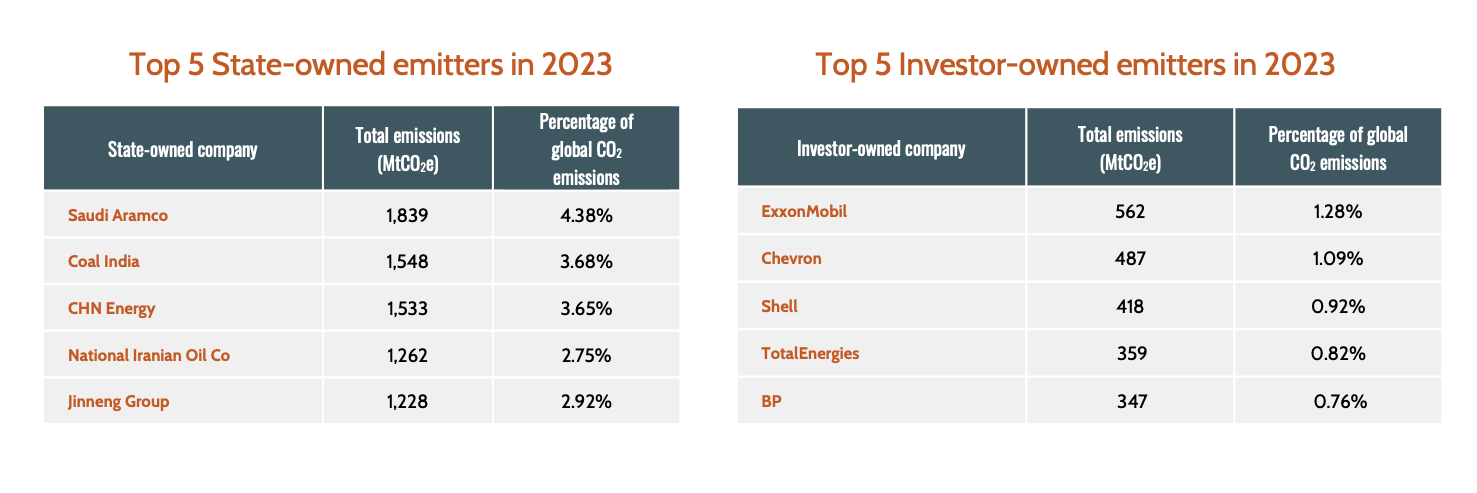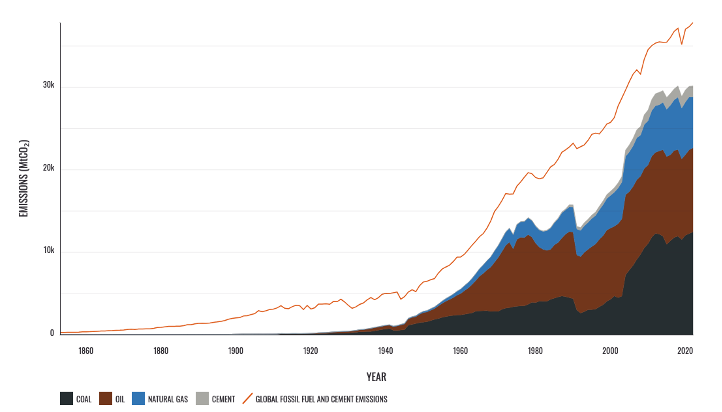New analysis of the latest emissions data from the Carbon Majors database reveals that emissions from the world’s largest oil, gas, coal, and cement producers increased in 2023 compared to 2022, with over 50% of these emissions linked to just 36 high-emitting companies.
Despite overwhelming scientific evidence connecting greenhouse gas emissions and catastrophic global warming, 93 of the companies in the Carbon Majors database increased their emissions in 2023, including 50 investor-owned companies.
Key Updates:
In the last year, the Carbon Majors database has been an instrumental part of attribution research aimed at advancing climate accountability around the world. The database has proved particularly useful for regional governments and communities harmed by climate change that are seeking to hold companies accountable for their contribution to climate damages.
Most notably, Carbon Majors is being used as an evidence source in the US to support Climate Superfund laws in Vermont (passed in May 2024) and New York (passed in December 2024), with similar proposals at various stages in at least five additional states. Researchers have also used the database to quantify the role of fossil fuel companies in intensifying extreme heatwaves, while legal advocacy groups have cited it to support potential criminal charges against fossil fuel executives for reckless endangerment. Additionally, the database has been referenced in regulatory actions, such as ClientEarth’s complaint against BlackRock for misleading investors.

The top five state-owned emitters—Saudi Aramco, Coal India, CHN Energy, National Iranian Oil Co., and Jinneng Group—were responsible for 17.4% of all CO₂ emissions in 2023 (7.4 GtCO₂e). Notably, Coal India, CHN Energy, National Iranian Oil Co., and Jinneng Group all increased their emissions in 2023 compared to 2022.
The top five investor-owned emitters—ExxonMobil, Chevron, Shell, TotalEnergies, and BP—accounted for 4.9% of global CO₂ emissions in 2023 (2.2 GtCO₂e).
The Carbon Majors dataset covers emissions from 1854 to 2023, revealing that 67.5% of anthropogenic industrial CO₂ emissions since the Industrial Revolution can be traced to 180 corporate and state-producing entities in the database. Over this period, just 26 entities accounted for more than one-third of global CO₂ emissions. This latest update also includes newly disaggregated coal emissions from China, Russia, the Czech Republic, Poland, Ukraine, and Kazakhstan, which were previously reported only at the national level.

Christiana Figueres said:
“The carbon majors are keeping the world hooked on fossil fuels with no plans to slow production. While states drag their heels on their Paris Agreement commitments, state-owned companies are dominating global emissions—ignoring the desperate
needs of their citizens. The science is clear: we cannot move backwards to more fossil fuels and more extraction. Instead, we must move forward to the many possibilities of a decarbonized economic system that works for people and the planet."
Emmett Connaire, Senior Analyst at InfluenceMap said:
“The latest analysis of the Carbon Majors database reveals that, despite global climate commitments, a small group of the world’s largest fossil fuel producers are significantly increasing production and emissions. InfluenceMap's research highlights the disproportionate impact these companies have on the climate crisis, with some now facing legal action in the US under Climate Superfund laws, informed by findings from the database. This underscores the critical role of Carbon Majors in tracing emissions, driving systemic change, and supporting efforts to enforce corporate responsibility.”
Kumi Naidoo, President of the Fossil Fuel Non-Proliferation Treaty Initiative said:
"We are living at a critical moment in human history. And the alarming reality is that the world’s largest fossil fuel companies are not only increasing their emissions, but they are doing so against a backdrop of climate events that are having devastating impacts on people’s daily lives. It is essential that governments step up and use their authority to end the root cause of the crisis we find ourselves in: the expansion of fossil fuels. We urgently need to transition to more sustainable, fair and affordable economic and energy models for all, or what will be left for future generations will be a broken planet."
Johan Rockström, Director of the Potsdam Institute for Climate Impact Research, said:
“Global GHG emissions continue to rise, with over half of all fossil CO2 emissions coming from just 36 companies, as the latest InfluenceMap findings reveal. While a few profit-driven corporations continue to expand fossil fuel infrastructure, climate disasters are hitting hardest in regions where people have contributed the least, damaging the lives of millions and pushing us closer to unmanageable tipping points. A global turnaround is not just urgent – it’s essential, and it must start with these key players.”
Tzeporah Berman, Founder and Co-chair of the Fossil Fuel Non-Proliferation Treaty Initiative, said:
“It is truly alarming that the largest fossil fuel companies continue to increase their emissions in the face of worsening natural disasters caused by climate change, disregarding scientific evidence that these emissions are harming us all. It is clearer than ever that dirty private companies, driven by profits and business as usual, will never choose to self-regulate. Governments around the world must use their power to end fossil fuel expansion and transition their economies before fossil fuel companies destroy the planet.”
Kitty Hatchley, Media Manager, InfluenceMap (London)
Email: kitty.hatchley {@} influencemap.org